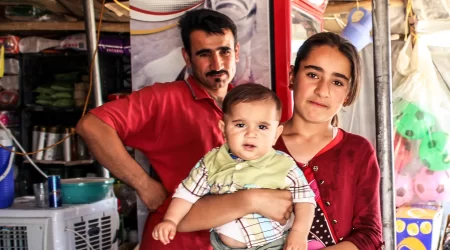BIOPATH study
 Refugee children are at increased risk of developing mental health problems due to war-related traumatic experiences and the often significant challenge of living in humanitarian settings.
Refugee children are at increased risk of developing mental health problems due to war-related traumatic experiences and the often significant challenge of living in humanitarian settings.
However, some refugee children show remarkable psychological resilience despite exposure to war and displacement. Such individual differences in risk and resilience are most likely the result of the complex and dynamic interplay between biological (e.g., genetic, epigenetic, hormonal) and psychosocial (e.g., housing conditions, social support, family relationships) factors over time.
The BIOPATH study aims to advance our understanding of how psychosocial and biological factors influence risk and resilience in a large sample of 1,595 Syrian refugee children (aged 6-19 years) and their primary caregivers living in informal tented settlements in the Beqaa region, Lebanon.
Data collection for the longitudinal study was conducted from 2017 until 2019 across two time points. The specific objectives of the BIOPATH study are to:
- Examine biological differences between resilient and vulnerable Syrian refugee children
- Investigate genetic moderation of trauma exposure on psychological and biological outcomes
- Examine associations between environmental factors and DNA methylation (epigenetics)
- Investigate the effects of protective factors on the development of adaptive outcomes in refugee children
- Examine the development of refugee children's psychological resilience over time
Research Partners:
- Queen Mary University of London (PI: Prof Michael Pluess; Dr Fiona McEwen; Prof Vardhman Rakyan)
- Institute for Development, Research, Advocacy and Applied Care (IDRAAC; Co-PI: Prof Elie Karam; Dr John Fayyad)
- Médecins du Monde (MdM; Patricia Moghames)
- University College London (Prof Stephan Beck)
- University of Western Ontario (Prof Stan van Uum; Prof Michael Rieder)
Funding
- The BIOPATH study is funded by a grant from the Eunice Shriver National Institute of Child Health and Human Development (NICHD; R01HD083387)
See here, for a detailed description of the study and measures used.
Webinar
Mental Health of Refugee Children: New Findings on Syrian Refugees in Lebanon (BIOPATH Study)
In this webinar, broadcast on October 26 2022, we introduced the BIOPATH study and presented recent research findings on the prevalence and predictors of mental health problems in Syrian refugee children, as well as predictors of psychological resilience, and the association between war exposure and hair cortisol.
Go to the webinar blog post to find out more.
BIOPATH related projects
BIOPATH Team
The BIOPATH study was set up by PI Prof Michael Pluess and co-PI Prof Elie Karam as a collaboration between researchers in the UK and Lebanon.
- Michael Pluess (University of Surrey, UK; Queen Mary University of London, UK)
- Elie Karam (IDRAAC; Saint George Hospital University Medical Center; Faculty of Medicine, Balamand University, Lebanon)
The study has been coordinated by Dr Fiona McEwen.
- Fiona McEwen (QMUL/KCL)
Research Team (in alphabetical order)
- Claudinei Biazoli (QMUL)
- Candace Black (QMUL)
- Paul Bolton (JHU)
- Tania Bosqui - Tania Bosqui (AUB/TCD)
- Nicolas Chehade (Research Manager for t-CETA study)
- John Fayyad (IDRAAC)
- Kristin Hadfield (TCD/QMUL)
- Georges Karam (IDRAAC)
- Andrew May (University of Surrey)
- Patricia Moghames (Field Work Coordinator for BIOPATH and VaST studies)
- Laura Murray (JHU)
- Cassandra Popham (QMUL)
- Vardhman Rakyan (QMUL)
- Dahlia Saab (IDRACC)
- Stephanie Skavenski (JHU)
- Demelza Smeeth (QMUL/University of Surrey)
- Roland Weierstall (JHU)
Clinical Team (Lebanon)
- Vanessa Kyrillos – clinical psychologist
- Gisèle Asmar – psychotherapist
- Diana Abdul Rahman – counsellor / case manager
- Stephanie Saad – counsellor / case manager
- Elyze Nassr – case manager
We would like to thank the following people for their ideas and support in establishing this research:
- Alaa Hijazi
- Nicolas Puvis
- Zeina Hassan
The research was only possible with the support of a large number of students, research assistants, volunteers, and support staff in the UK and Lebanon:
UK
- Mona Ayoub
- Melisa Chuong
- Bernadette de Villiers
- Rawan Hassan
- Khadija Rita Khatun
- Madeleine King
- Jennifer McBride
- Marissa Nivison
- Olivia Pennikian
- Karen Pluess
- Laila Rida
- Sophie Walker
- Ayse Selin Zorlu
BIOPATH Team in Lebanon
- Inas Abdel Ghani
- Jean Jacques Abou Zeid
- Anas Al Ajami
- Omar Al Ajami
- Bilal Al Mahmoud
- Zainab Al Masri
- Khaled Ammouri
- Hiba Amro
- Abdel Majed Anka
- Khouloud Araji
- Haitham Awada
- Kamar Bahaaedine
- Malak Chall
- Khalil El Sayed
- Layal El Sayed
- Katherine Gebrayel
- Bechara Ghorayib
- Jamil Haidar
- Mouin Hammoud
- Lara Hanna
- Rima Hassan
- Ekbal Harb
- Mohammad Hoshaimi
- Alaa Kabtul
- Israa Karout
- Sarah Kassem
- Yasmine Khaled
- Mariam Makki
- Ibrahim Mdallali
- Sara Nuwayhid
- Chahnaz Rifaii
- Khaled Salloum
- Malak Salloum
- Hoda Samaha
- Zainab Shaib
- Alaa Shoker
- Nabil Taha
KEY
AUB: American University of Beirut, Lebanon
BU: Faculty of Medicine, Balamand University, Lebanon
IDRAAC: Institute of Research, Advocacy, and Applied Care, Lebanon
JHU: Johns Hopkins University, US
KCL: King’s College London, UK
MSH: Medical School Hamburg, Germany
QMUL: Queen Mary University of London, UK
SGHUMC: Saint George Hospital University Medical Center, Lebanon
TCD: Trinity College Dublin, The University of Dublin, Ireland
